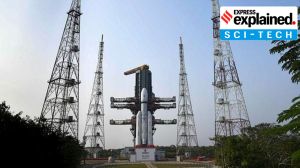Rajkot, Gandhinagar trail as 72% Smart Cities projects completed in Gujarat
Six cities of Gujarat are among the 100 picked under the Centre's Smart Cities Mission (SCM). Of the six, Gandhinagar, which is also the state capital, is the least populated.
 Launched by Prime Minister Narendra Modi in 2015, 100 cities were selected in several rounds of the mission between 2016 and 2018.
Launched by Prime Minister Narendra Modi in 2015, 100 cities were selected in several rounds of the mission between 2016 and 2018. An RFID (Radio-frequency identification)-based cattle tracker in Ahmedabad, an automated land encroachment prevention system in Vadodara, and skywalks in Surat are among the 344 Smart City projects being implemented in Gujarat. Of these 334 projects, worth over Rs 12,473 crore, 72 per cent have been completed, according to official data.
Six cities of Gujarat are among the 100 picked under the Centre’s Smart Cities Mission (SCM). Of the six, Gandhinagar, which is also the state capital, is the least populated. Ahmedabad, Vadodara, Surat, Rajkot, and Dahod are other cities on the list. The state government data analysed by The Indian Express also highlights that cities like Rajkot and the capital city of Gandhinagar have a significantly higher number of projects that are incomplete. If the value of the projects is taken into consideration, 56 per cent of the projects in Rajkot worth Rs 2,162 crore are still incomplete, while 50 per cent of projects worth Rs 1,007 crore in Gandhinagar are under various stages of implementation.

“Land acquisition issues have delayed some of the projects in Rajkot, Gandhinagar, and Dahod,” said an official from the Gujarat Urban Development Mission (GUDM), a state government arm to monitor the implementation of the projects. GUDM officials also say some projects like the advanced disease warning and control system for Ahmedabad were dropped from the list during Covid. No reasons were assigned, however, for the move.
Launched by Prime Minister Narendra Modi in 2015, 100 cities were selected in several rounds of the mission between 2016 and 2018. The Centre had promised to provide financial support to these projects for five years ending June 2023, the deadline having been recently extended by a year.
In Gujarat, 281 projects worth Rs 8,963 crore have been completed, while another 63 projects worth Rs 3,510 crore are under various stages of implementation. The central government, the state government, and urban local bodies largely provide the financial support for these projects. Some projects like Sursagar Lake redevelopment and Kalaghoda River bridge widening in Vadodara, beautification and lighting of bridges Sardar Bridge, Ellisbridge, and Nehru Bridge in Ahmedabad have also made it to the project list.
In terms of the value of the projects, Surat has achieved 92 per cent completion, Vadodara has completed 82 per cent of projects, while Ahmedabad and Dahod have completed 74 per cent and 67 per cent of projects, respectively.
Getting basic amenities
Dahod recently made it to headlines when the Smart City administration razed several structures, including a century-old mosque and temples, to make way for a “road widening project” amid objections. With a population of 26 lakh, it is arguably the least urbanised among the lot. The municipal corporations in other cities already have projects listed under the SCM in their mandate.
Dahod is a municipality carved out in 1997, sharing its borders with the Banswara district of Rajasthan and the Jhabua district of Madhya Pradesh. While the mission is implemented, Rs 150 crore has been spent to install an integrated command and control centre, and a surveillance system just like Ahmedabad was set up at the cost of Rs 250 crore. There is also a “city beautification project” where artistic talent will be on display.
Officials point out that the selection of smaller cities like Dahod has helped speed up the rollout of basic infrastructure which was earlier missing.
“Due to the Smart City project, we have been able to quickly provide basic services like drinking water, sewerage system, and stormwater drainage to Dahod which is a remote area in the state. After Dahod got selected as a Smart City in 2018, we have done a lot of work, including providing drinking water to the water-scarce region. Among several projects that we have completed, we have enabled RFID tags on waste collection vans to ensure that garbage is being collected on a daily basis,” said Dr Harshit Gosavi, district collector of Dahod who also heads the special purpose vehicle that implements the Smart City projects in Dahod.
Meanwhile, Amit Chavda, Leader of the Congress Legislative Party in Gujarat Assembly, points out the loopholes. Recalling his recent visit to Dahod for the party’s outreach campaign “Jan Manch”, he said, “When we were in Dahod, we got to know that an amount of over Rs 500 crore has been spent in the city. Despite this, the residents were getting a water supply once every six days. The administration has spent Rs 100 crore on beautification of a city lake, while the entire city faces traffic snarls on a daily basis,” Chavda said, adding the Jawaharlal Nehru National Urban Renewal Mission (JNNURM) by the former UPA government provided similar central grants for development of city infrastructure.
Keeping a tab on cattle menace and more
Under the Smart City project, 50,000 cattle in Ahmedabad have been injected with RFID or Radio Frequency Identification Data tags by the Cattle Nuisance Control Department of the Ahmedabad Municipal Corporation (AMC).
The tags containing information about the animal’s age, breed, milk yield, and owner details, help authorities to track down errant owners if the cattle stray on city roads. It also prevents illegal cow slaughter and helps owners track their cattle.
Similarly, the Automated Land Encroachment Prevention System is a video analytics-based system that automatically detects incidents of encroachments in land parcels owned by Vadodara Municipal Corporation. This system has been implemented in all four zones of the corporation.
Intelligent Transit Management Systems, round-the-clock water supply systems, rainwater harvesting, reuse of treated waste water, smart street lights, rooftop solar power plants, upgradation of sewage treatment plants, self-sanitising e-toilets, smart anganwadis are some of the common projects implemented in the six cities under the mission.







